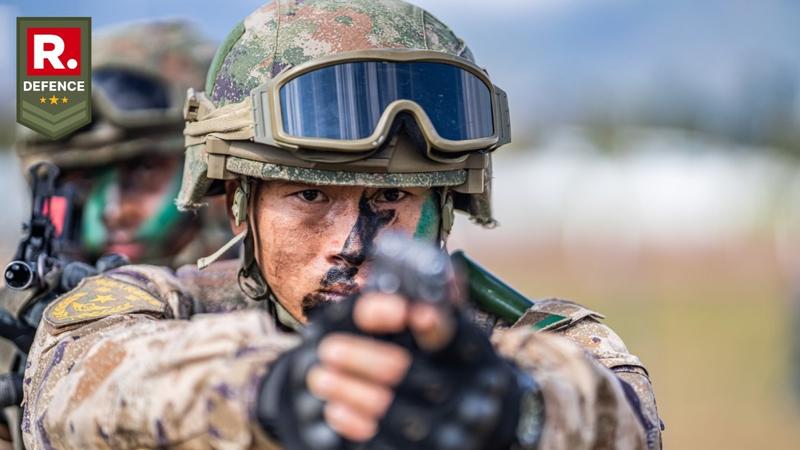Published 06:15 IST, December 24th 2024
PLA’s Battle with Corruption Could Impact Taiwan Invasion by 2027, Pentagon Warns
The report outlines how internal investigations and leadership shakeups have delayed advancements in critical areas like advanced technology and joint pos.

Washington D.C. – Rampant corruption within the Chinese military is increasingly becoming a significant obstacle to its long-term strategic ambitions, including its goal of potentially invading Taiwan by 2027, according to the Pentagon’s annual report on China’s military, released Wednesday. While the People’s Liberation Army (PLA) continues to expand and modernize, the report highlights that an ongoing anti-corruption campaign may delay crucial milestones, particularly in preparation for an invasion of Taiwan.
The Pentagon’s assessment underscores the serious challenges facing the PLA as it works towards its self-imposed 2027 timeline for enhancing military capabilities, which includes the use of advanced technology and joint operations training. However, the widespread corruption within the military has begun to undermine progress, with key figures in China’s defence industry and armed forces being investigated or removed from their posts. Between July and December 2023 alone, at least 15 high-ranking officials were sacked over corruption charges, signalling the deep-rooted nature of graft within the military.
One of the most notable figures affected by the corruption probe is China’s Defense Minister, Dong Jun, who is reportedly under investigation for bribery, following in the footsteps of his two predecessors, both of whom were also charged with corruption. In a highly unusual move, a member of China’s seven-member military board was also placed under investigation in November, further indicating the seriousness of the issue within the upper echelons of military leadership.
Impact on Beijing's 2027 Goals
President Xi Jinping has made it clear that he expects the PLA to be ready to launch an invasion of Taiwan by 2027, with a focus on enhancing China’s military capabilities. However, according to U.S. defence officials, the country’s internal issues with corruption are hindering this progress. A senior Pentagon official, speaking on the condition of anonymity, noted that while Xi remains committed to this goal, the anti-corruption campaign has already begun to impact China’s ability to meet its military objectives.

“It’s having some impact already,” the official said, although they declined to specify whether China would meet its 2027 military goals. The official further acknowledged that corruption within the PLA could slow down the development of necessary capabilities, such as advanced technology and improved coordination across different military branches.
The Pentagon has long been concerned about China’s ability to modernize its military and prepare for a potential conflict over Taiwan, especially given the country’s rapid military expansion in recent years. However, the report suggests that internal instability in the form of corruption could derail these ambitions.
Weaknesses in Command, Training, and Logistics
Beyond corruption, the Pentagon report also points to other weaknesses in China’s military structure that could hinder its ability to conduct a successful military operation, especially in the context of Taiwan. Among these are issues with the quality of commanding officers, urban warfare strategies, and logistical capabilities—critical components in any military operation, particularly one targeting Taiwan, a heavily fortified island with challenging geographical barriers.
The report suggests that China’s focus on technological advancements has not been fully matched by improvements in the fundamental elements of military command and operations. These gaps in leadership and logistical coordination could severely limit the PLA’s ability to conduct a large-scale, high-stakes operation like an invasion of Taiwan.
China’s Growing Military Arsenal
Despite the challenges posed by internal corruption, China continues to aggressively modernize its military, with significant investments in both conventional and nuclear capabilities. The Pentagon report highlights the rapid growth of China’s nuclear arsenal, which is expected to reach 600 operational warheads by mid-2024, marking a significant increase from the previous year. In 2023 alone, China added approximately 100 new warheads to its stockpile, further contributing to concerns over the nation’s growing military capabilities.

U.S. officials have expressed frustration over China’s reluctance to engage in open discussions about the motivations behind its nuclear buildup. Chinese officials maintain that their nuclear force remains proportional to their national security needs, but U.S. analysts argue that the scope of their arsenal suggests a shift in their defence strategy.
A Military Power in Flux
The annual China Military Power Report, which provides the most detailed public assessment of China’s military capabilities, underscores the contradictions within China’s military strategy. While the PLA continues to modernize at an unprecedented pace, it is simultaneously grappling with significant internal issues that could delay its ability to achieve its long-term objectives, particularly with regard to Taiwan.
The report also reflects the geopolitical tensions surrounding Taiwan, which remains one of the most contentious flashpoints in U.S.-China relations. While Xi Jinping has made it a central goal of his presidency to achieve military supremacy by mid-century, the ongoing corruption scandals within the PLA represent a significant impediment to those ambitions.

As the 2027 deadline approaches, it remains uncertain whether China will be able to overcome these internal challenges and fulfil its military goals. The U.S. remains vigilant, closely monitoring China’s military buildup while preparing for potential contingencies in the Taiwan Strait. With corruption threatening to delay China’s military goals, it is clear that while Beijing has made impressive strides in modernizing its military, it still faces significant internal challenges that could shape the outcome of future conflicts in the region.
Updated 06:15 IST, December 24th 2024




